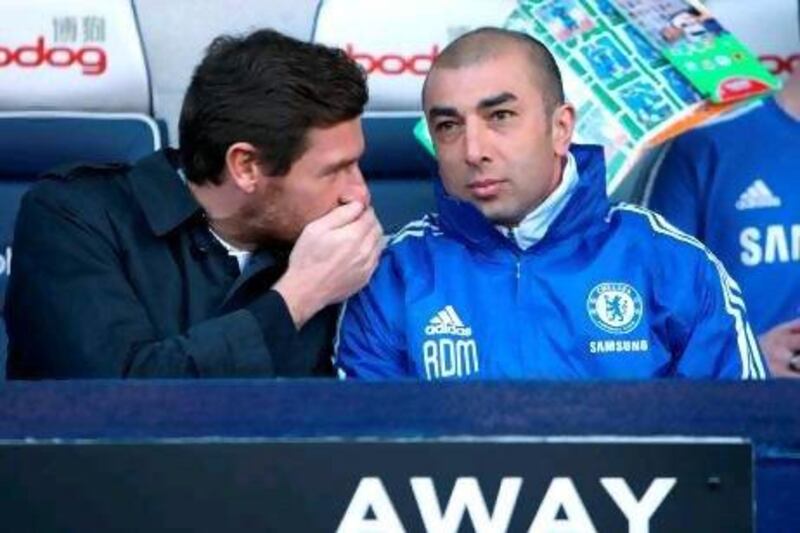For Roman Abramovich managerial casualty number four of seven (he did for 2009 caretaker Ray Wilkins eventually) Andre Villas-Boas's dismissal is "strange, but not that strange".
"Villa-Boas won everything and will continue to be a champion," said Luiz Felipe Scolari. "The club needed to change seven or eight players. He knew that from the moment he got there, but he wasn't able to. Now it's going to be hell for his successor."
Arsene Wenger, a man who has watched one Abramovich commandant after another depart their post regardless of competence or success, agrees. Wenger will tell you that too many players have been at Chelsea too long, watching too many managers exit. It would never happen at Arsenal or Manchester United, where no one is more important than the two grand survivors who shape and constantly restructure their teams.
The irony of Abramovich dispensing with yet another expensive appointment was that the billionaire had drawn the same conclusion.
This was not the dismissal suffered by Scolari, where Abramovich took counsel from disgruntled senior professionals and removed their boss. This time Chelsea's owner had merely observed the fault lines, watched performances and results decline, and calculated that enough was enough.
There were few, if any, discussions with the disaffected. And precious little sympathy with his richly rewarded employees' view that all could be well again if Villas-Boas was exchanged for a manager with a more mature hand.
Instead, Abramovich agreed with Villas-Boas (and Wenger's) view that a squad that had brought him three Premier League titles required a fundamental restructure.
Together they had drawn up a plan to sell or release many of its longest serving principals. Frank Lampard, Didier Drogba, Ashley Cole, Michael Essien, Florent Malouda, John Obi Mikel, Salomon Kalou, Paulo Ferreira were all to go. Petr Cech was in danger. And, if Villas-Boas had his way, Fernando Torres, would be dispensed with too.
It was an extraordinary exit list, the ultimate product of Abramovich's first conversation with his young Portuguese coach before the latter's recruitment from FC Porto last summer. And ultimately the source of Villas-Boas's downfall.
Two fatal mistakes grew from it. Error one was Abramovich's failure to start the change from the outset. If there was to be a radical clear-out it needed to be implemented when the new manager arrived, acting as a symbol of his authority, and allowing him to start his work at a notoriously difficult club with a core of new players of his own choosing.
The decision to back-off - seemingly motivated by incoming Uefa Financial Fair Play regulations that allow clubs to ignore the cost of contracts agreed before June 2010 - led to error two. This one completely of Villas-Boas's own making.
Asked to utilise players he considered past their best, the 34 year old failed to take advantage of the capital he held with them for being part of Jose Mourinho's all conquering management team. The old guard liked Villas-Boas, respected his treble winning achievements at Porto, and were impressed by training and preparatory methods akin to his mentor's. They wanted the Premier League back, to prove the Champions League was not beyond them, and were ready to be led there.
What they were to be utterly unimpressed with was Villas-Boas's man management. Drogba came to the new manager to ask if he would have a fair opportunity to start matches with, or ahead of, owner's favourite Torres, or be allowed to leave. The Ivorian was told that Villas-Boas considered him a fading force; one that he would sell if he could but wasn't yet allowed to.
Drogba walked out of the meeting bemused by the manager's bluntness, quickly passing the tactless message onto others about to suffer similar fates.
Frank Lampard the scorer of at least 10 Premier League goals in an unprecedented nine consecutive seasons suggested he could help the team by playing off the main striker. In front of his teammates, Villas-Boas accused the England international of only being interested in scoring goals, adding that Lampard was "not his type of player". Here again, was the lack of "emotional intelligence" those who knew Villas-Boas had worried about.
Though he patently didn't possess the players required by them, Villas-Boas insisted on employing tactics that cost a succession of points and goal after embarrassing goal. John Terry's absence of pace was highlighted by an aggressive defensive line that Wenger, in particular, took gory advantage of.
Terry, at one stage described as "leading the resistance" to Villas-Boas, was converted into an ally when the Portuguese vigorously defended his captain against charges of racism. Instead of further pursuing the logical plan to phase Chelsea's declining central defender out of the first team, Terry became one of his few automatic choices.
Emboldened by Abramovich's antipathy toward the squad, Villas-Boas indulged in a series of ill-advised public pronouncements.
"They [the players] don't have to back my project, it's the owner that backs my project," he said on February 16, following that up with an interview that compared Torres to the owner's last transfer-record catastrophe, Andriy Shevchenko.
His employer infuriated, Villas-Boas's exit was a matter of time, Saturday's desultory loss to West Bromwich Albion accelerating the sacking he has been warned would come with a Champions League exit to Napoli. Now, he must re-establish his reputation elsewhere with his preference the Spanish league, where Valencia and Sevilla are in the market for new coaches.
Chelsea's own search may deliver Pep Guardiola, Joachim Low, or an old one. Nobody is better placed to restore sense and success to Stamford Bridge than Jose Mourinho, who will consider an invitation to return. Abramovich, you feel, doesn't deserve such good fortune.
[ sports@thenational.ae ]





